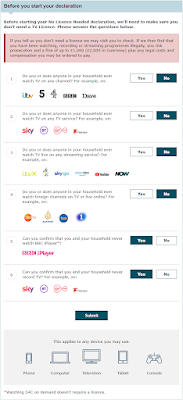A few days ago, as you may have heard on the grapevine, we broke the news that the BBC's secretive TV detection methods are failing to keep pace with advances in technology.
That's not our opinion - it is an observation made by the official surveillance regulator, the Investigatory Powers Commissioner's Office (IPCO), in its most recent report on the BBC's snooping powers.
According to the BBC's Annual Report for 2023/24, the Corporation spent £137 million on the administration and enforcement of the TV licence fee. That was an increase of £15 million on the previous year.
The BBC is spending a lot of public money chasing after TV licence fees, so it is a matter of legitimate public concern if its secretive, white-elephant technology is not up to scratch.
So what, exactly, are the technological challenges faced by the BBC as it attempts to enforce the TV licence fee?
The biggest challenge has been in a marked shift in viewer behaviour over the last decade or so.
A decade ago the vast majority of viewers turned on their television sets and settled down to enjoy their favourite programmes at their time of broadcast. This, so-called linear viewing, legally requires a TV licence.
However, the latest figures indicate that linear viewing now accounts for less than half of all viewing by UK adults. An increasing number are turning to non-linear, on-demand viewing, which allows them to enjoy their favourite programmes at a time of their own choosing and, crucially, without the legal need for a TV licence.
Non-linear platforms include:
- YouTube;
- My5;
- ITVX;
- Channel 4 On Demand;
- Netflix;
- Amazon Prime Instant Video;
- BBC iPlayer (requires a TV licence).
Generally speaking a TV licence is not required for non-linear, on-demand viewing. The only exception, where a TV licence is required, is for watching or downloading BBC on-demand programmes via the iPlayer.
Pretty much anything anyone could ever want to watch is available on-demand, without the legal need for a TV licence, via YouTube. An increasing number of viewers are getting all of their content from YouTube, with three-quarters of millennials tuning in there first. Much to the BBC's frustration YouTube includes many programmes ripped from the BBC iPlayer which, if viewed on that platform, would require a TV licence.
In the last decade there has also been a surge in the number of UK viewers subscribing to online streaming services like Netflix and Amazon Prime Instant Video (aff. link - use for 30 day free trial). The overwhelming majority of content on those platforms is available on-demand and without the legal need for a TV licence.
There are now around 17 million Netflix subscribers in the UK, which has increased by 50% in the last five years. Amazon Prime Instant Video has around 13 million UK subscribers, which represents an increase of 120% in the last five years. The annual cost of a standard Netflix subscription is £131.88, whereas the corresponding Amazon Prime Instant Video subscription is £71.88.
These on-demand services cost significantly less than the £169.50 annual TV licence fee. Furthermore, it has to be said that neither Netflix nor Amazon use the threat of criminal prosecution as an aid to subscriber retention.
Because an increasing number of viewers are turning to these platforms and using Smart TVs (aff. link) and online streaming devices (aff. link) for their viewing, there is far less opportunity for TV Licensing to catch evaders in the act.
In terms of enforcement these on-demand services are delivered via the internet instead of via the airwaves, so any attempts at TV detection are rendered ineffective. TV Licensing cannot snoop on people's private internet connections, because it lacks the capability to do so. Even if it had the capability, it would not have the legal authority to use such invasive methods of investigation. TV Licensing is not MI5 and does not have the full powers of the state at its fingertips, despite liking people to think otherwise.
Viewers now have a stark choice: Pay £169.50 for a TV licence because they feel compelled to; or pay considerably less for a subscription service because they want to. The BBC simply cannot compete with that, which is why it does everything possible to "persuade" people into paying the TV licence fee.
No wonder an increasing number of viewers are ditching the TV licence fee.
If you've found this article useful please consider liking us on Facebook, following us on Twitter or downloading our free ebook.
Further anti-BBC reading:



